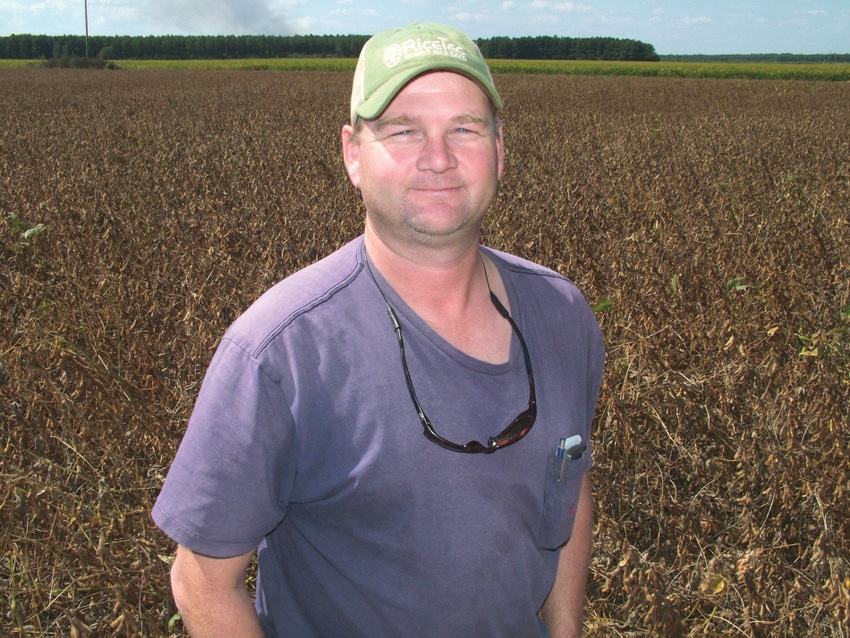
Heath Long, who typically farms 2,200 acres of rice, soybeans and wheat with his wife, Betsy, on Long Planting Co., says that high nighttime temperatures the last few years have made rice a risky crop to grow.Long will plant more hybrid rice this season primarily because they’ve held up better in the heat than varietal rice.On most of his ground, Long will stick with a two-year rotations of rice and soybeans and a three-year rotation with rice, soybeans, wheat, and double-cropped soybeans.

A subpar rice crop in 2011 is pushing producer Heath Long to make several changes in his crop mix for 2012. The Tichnor, Ark., producer plans to decrease his overall rice acreage, increase his percentage of hybrid rice and plant corn for the first time.
Long, who typically farms 2,200 acres of rice, soybeans and wheat with his wife, Betsy, on Long Planting Co., says that high nighttime temperatures the last few years have simply made rice a risky crop to grow.
“My rice yield has decreased for the last five years in a row. I had some hybrid rice that did really well, but my varietal rice was 25-30 bushels off. We also had panicle blight this year in the varietal rice. The rice was beautiful just looking at it. But it has blanks, and the yield was just not there.”
Long will plant more hybrid rice this season primarily because they’ve held up better in the heat than varietal rice. “They are also more resistant to the panicle blight. A lot of varietal rice will get it and there’s nothing you can do about it.”
Long has settled into a good rotation with rice, soybeans and wheat, with several fields in two-year rotations in rice and soybeans and everything else in a three-year rotation with rice, soybeans, wheat, and double-cropped soybeans. “I’m still on that on 90 percent of the farm.”
Rice in the rotation is one reason why glyphosate-resistant pigweeds and horseweed haven’t taken over any fields, according to Long. “The pigweeds show up first where farmers are planting soybeans and cotton and using glyphosate behind glyphosate. Where rice is planted, it’s helping. But I think the corn will do the same thing.”
Long says he’s continued to use residual herbicides in his burndown programs, even when using the Roundup Ready system. “I also have a problem with Texas gourds. So we were always putting something else out with our Roundup.”
Long will also rotate some LibertyLink soybeans into the crop mix to address glyphosate-resistant weeds with a different chemistry.
Sometimes, using different modes of action isn’t enough. For example, this spring’s flooding deposited a lot of pigweed seed, meaning Long will be much more attentive to potential problems in 2012. “I had about 500 acres of bottomland that was completely under water. Pigweeds were really bad down there. We spent three weeks this summer chopping. I used to chop when I was a kid, when my father was farming. I didn’t like it then. I still don’t like it now.”
Long will likely introduce corn to his operation in 2012, probably on rougher rice fields “with lots of levees that require lots of labor.”
Long, who started farming on his own in 1994, says corn will cost less to produce than rice, “and it will take less water. Looking at cutting corn versus rice, you won’t tear a combine up as fast bouncing over all these levees. A farmer I know in Gillette told me his worse corn out-yielded his best rice, he got $2 more a bushel for it and it cost $100 less an acre to grow. You don’t need a lot of education to figure that one out.”
Corn does have its own issues, notes Long. “The heat can affect the corn too, and the hogs will dig it up, so you have to figure on that. And I’m going to have to buy a planter and a corn header.”
Long improved his harvesting efficiency this season, trading two older combines for one with much more threshing capacity, a Case IH 7120. “I don’t have as much downtime. The hopper holds 315 bushels, the older ones held 200 bushels. It unloads faster so the grain cart can keep up real easy. This combine is unbelievable, with all the things you can do with the GPS technology.”
Long, who was recently selected for the Rice Leadership Development Program’s international class members for 2011, says farming “is a roller coaster ride these days. It seems like it’s either feast or famine. After a good year, you go out and update equipment, then you have two bad years and you wonder how you’re going to pay for it.”
Long says reductions or elimination of some farm payments, if it happens, will be challenging for producers, but any losses should offset in some other way. “There might have to be rent adjustment on some of this ground where the rent is real high and the ground may not be that good. We still need a safety net, too, like the loan program. Nobody is going to farm rice for $3 a bushel.”
That’s especially true if rice yields continue to decline. So Long is hoping that by replacing some rice acres with corn, which he plans to furrow irrigate, he can reduce some of his revenue and production risk in 2012. “Corn is a good rotational partner, and it’s good for your ground. If I like the corn, I probably will be taking more rice acres out in the future. But it’s brand new territory for me.”
About the Author(s)
You May Also Like





